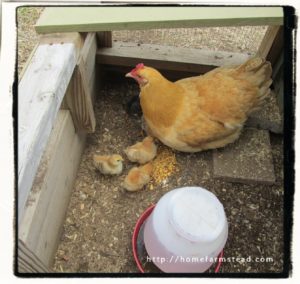 It’s probably likely that some of you will want to go one step further and hatch and raise your own chicks from your existing stock. Breeding chickens couldn’t be easier and it’s a worthwhile and rewarding project to get your kids involved in too.
It’s probably likely that some of you will want to go one step further and hatch and raise your own chicks from your existing stock. Breeding chickens couldn’t be easier and it’s a worthwhile and rewarding project to get your kids involved in too.
If your far enough from your nearest neighbors or lucky enough to have very understanding ones that don’t mind being woken at the crack of down by an over zealous cockerel announcing the dawn of a new day then you are already half way towards getting your hens to breed.
Firstly, you need make sure you have happy healthy hens in good breeding condition by following the guidelines in my earlier article. A plentiful supply of good food and the appropriate nesting facilities in the form of a well-constructed chicken coop.
Firstly, hens kept on their own without a cockerel present will not produce viable, fertile eggs. I know this is stating the obvious but you would be surprised how many people completely miss this critical point!
The introduction of the cockerel to your flock will ensure the eggs are fertile and likely to produce chicks after incubation. It will take no time at all for the cock and hen to do what comes naturally! Bear in mind that when a cockerel is present in the coop you can still collect the eggs and use them for consumption as long as they are collected fresh and haven’t been allowed to remain under the brooding hen for any length of time.
Don’t make the mistake of boiling an egg that has been half incubated! There is nothing more off putting than cracking one open to find a half formed chick inside, in fact you will probably never eat an egg again!
You should ideally remove the cockerel after a few days with the hens as he can become aggressive if he’s had enough of their company. Let him roam the yard or the garden but keep him out of the coop where your hens are going to brood.
Having said that, I have on many occasions left the cock with the hens without any problems but there is a risk attached.
When you decide to let the hen brood just stop collecting the eggs and allow her to start the incubation. It will take 21 days from the time the last egg is laid for the chicks to appear during which time you will have to do nothing other than feed your hens as normal and try to disturb the brooding hen as little as possible. The more peace and quiet she gets the more comfortable and secure she will feel and will be less likely to rise from the nest.
When you do see the chicks appear you can feed them with specially prepared chick crumb. This is small enough in size for the chicks to eat and has all the necessary nutrients for the early stages of development.
Keep a close eye on your chicks in the first few days and protect them from the usual hazards such as predators and watch for signs of the other hens pecking at them. You may need to separate them if this becomes a problem but never separate them from the mother hen, as this would require artificial heating etc.
Other than that you need do nothing besides enjoy the whole experience but keep these few tips in mind:
- Feed your brooding hens good quality food and make sure they have a plentiful supply of it.
- Keep disturbance to a minimum when your hens are brooding
- Watch for signs that the cockerel is troubling any brooding hens if he has been allowed to remain in the coop
- Dispose of any unhatched eggs carefully at the end of the incubation period, rotten eggs are extremely unpleasant!
- If you plan to keep the chicks and breed from them at a later stage, do make sure to use a different cockerel to prevent problems with inbreeding.
Keeping and breeding you own hens is a rewarding experience and the perfect way to complement the organic garden.









